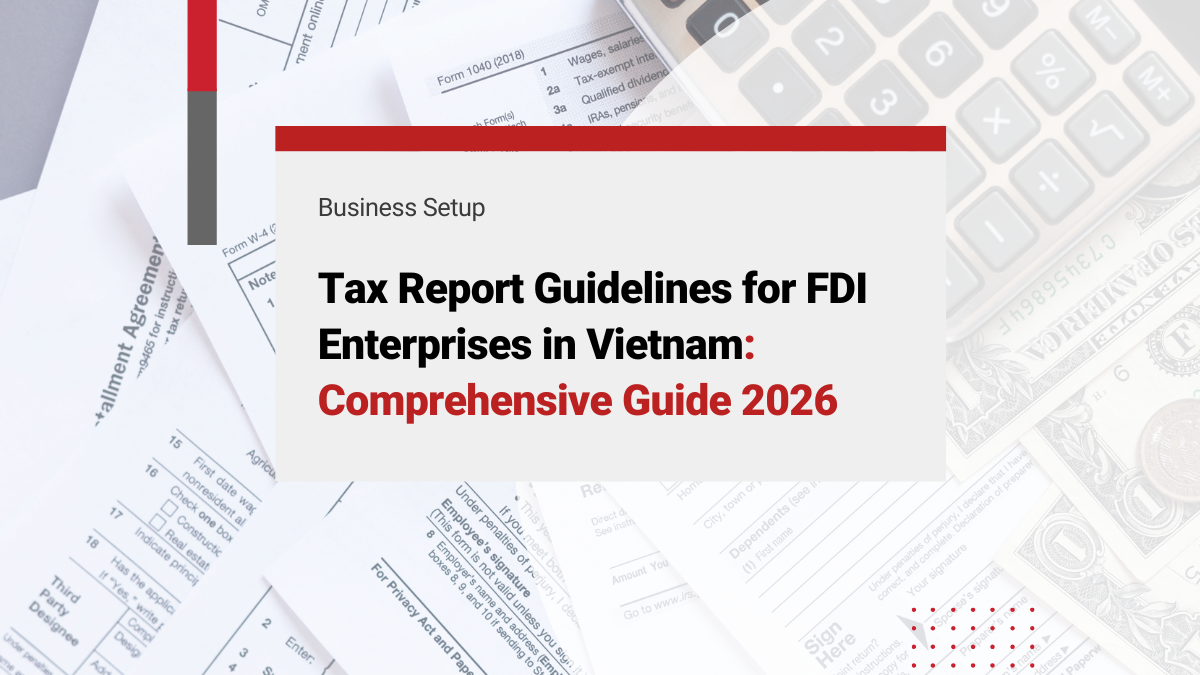Vietnam has rolled out significant tax reforms in 2025 that directly impact every major e-commerce platform and its users. As e-commerce sales surge and millions of small merchants come online, the government is modernizing tax laws to ensure fairness and compliance. These reforms include changes to Value Added Tax (VAT), Personal Income Tax (PIT), and Corporate Income Tax (CIT) – with special rules for transactions on e-commerce platforms. Startups and SMEs operating on or as e-commerce platforms must understand these changes, as they bring new obligations (like tax withholding at source) and new opportunities (such as lower CIT rates for small enterprises).
According to Mr. Jack Nguyen, CEO of InCorp Vietnam, “These reforms mark a turning point for e-commerce in Vietnam. Platforms and sellers who adapt early will not only stay compliant but also unlock new growth opportunities in one of Asia’s fastest-growing digital markets.”
Read More: A Guide To E-Commerce Taxes in Vietnam in 2025
In this article, we break down the recent tax changes and what they mean for e-commerce platforms, individual online sellers, and SMEs. We’ll explain how VAT, PIT, and CIT reforms are structured under the new regulations, clarify the responsibilities of e-commerce platform operators (especially regarding tax withholding and reporting), and discuss the broader impact on startups and SMEs in Vietnam’s booming digital marketplace.

VAT Changes Affecting E-Commerce Platforms
One of the headline reforms is the expansion and tightening of VAT rules for e-commerce activities. Under the new law, as of July 1, 2025, e-commerce platforms are required to withhold VAT on sales made through their platforms and remit it to tax authorities. This “tax withholding at source” mechanism means that whenever a customer buys a product or service on an e-commerce platform, a portion of that transaction (the VAT) is automatically collected by the platform for the government before the seller receives the balance.
Key VAT changes include:
- Withholding VAT on Domestic Sales: For transactions by local individuals or household businesses on a platform, the platform must withhold VAT at a fixed percentage of the gross revenue. The rate is 1% VAT on goods and 5% VAT on services sold via the platform. These rates apply regardless of whether the seller is below the normal VAT registration threshold or not, simplifying tax collection for the vast number of small online sellers.
- VAT on Foreign E-Commerce Providers: Vietnam’s new VAT law extended the definition of “VAT taxpayer” to include foreign vendors conducting e-commerce business in Vietnam. In fact, the VAT rate for foreign digital service providers (like overseas e-commerce or online service platforms selling into Vietnam) has been doubled from 5% to 10% effective July 1, 2025. This means overseas e-commerce companies earning income from Vietnamese users are now expected to register for VAT and charge 10% VAT on their sales in Vietnam, leveling the playing field with domestic businesses.
- Higher Threshold for Small Sellers: As a relief measure for micro-businesses, the revised VAT law doubles the annual revenue threshold that determines whether a household/individual business must pay VAT and PIT. Starting 2026, only those earning over VND 200 million per year (≈USD 8,000) will be subject to VAT and PIT obligations, up from the previous 100 million VND threshold. This change means very small sellers are exempt from taxes, reducing compliance burden on true casual sellers. E-commerce platforms will likely integrate this threshold by not withholding tax if a seller’s total yearly sales stay under VND 200 million, though implementation details are being clarified.
Overall, the VAT reforms aim to capture tax from the rapidly growing online commerce sector in a straightforward way. By making platforms withhold a low, fixed VAT on each sale, the government ensures tax compliance even from the smallest online vendors, while still encouraging micro-entrepreneurs through a higher exemption threshold. For startups and SMEs, it creates a more level playing field – everyone from big retailers to home-based sellers now has to factor in VAT, reducing unfair advantages for those who previously operated informally without taxes.
Personal Income Tax (PIT) Changes for Online Sellers
In tandem with VAT changes, the government has introduced parallel Personal Income Tax (PIT) rules for e-commerce earnings. These affect individual sellers (including sole traders and household businesses) on e-commerce platforms. Under the new regulations, e-commerce platforms must also withhold PIT from payments to individual sellers and remit it on their behalf. This essentially turns the platform into a tax collector for the income tax that these individuals owe on their earnings.
Key PIT aspects of the reform:
- Withholding PIT Rates: The withheld PIT is a small percentage of the gross transaction value, varying by type of income. For Vietnam-resident sellers, the platform will withhold 0.5% PIT on revenue from goods sold, and 2% PIT on revenue from services. If the sale involves transportation services or other services attached to goods (for example, delivery fees or installation services), the PIT rate is 1.5%. These rates align with Vietnam’s presumptive tax rates for business individuals, and they are applied on each order automatically.
- Non-resident Sellers: In case the seller is an individual based abroad (non-resident in Vietnam) but selling through a Vietnam-based platform, higher PIT rates apply – typically double the resident rate (e.g. 1% PIT on goods instead of 0.5%). This ensures foreign individuals also contribute tax on income sourced from Vietnam. However, the vast majority of individual sellers on local platforms are domestic, so the standard 0.5%/2% rates will cover most cases.
- Timing and Threshold: PIT (along with VAT) is withheld at the time of sale, i.e., as soon as an order is confirmed and the buyer’s payment is received. The platform deducts the tax before passing the remainder to the seller. If an order is canceled or refunded, any taxes that were withheld can be adjusted (offset against future filings) to avoid overpaying. As noted in the VAT section, individuals earning under VND 200 million/year are exempt from PIT on business income under the new law. Platforms will likely monitor sellers’ annual sales – once a seller crosses the threshold, withholding kicks in. This progressive approach means very small casual sellers won’t lose 0.5% of their tiny sales to PIT, encouraging budding entrepreneurs to start online.
The PIT reform is significant for SMEs and startups in the e-commerce space because it formalizes tax obligations for thousands of online micro-entrepreneurs. Many individuals who previously might not have declared their online income (due to small scale or lack of awareness) will now be automatically taxed through platform withholding. For the government, it greatly improves compliance and revenue collection from the digital economy. For the sellers, while it does trim their take-home revenue slightly, the rates are low and manageable. It’s important for startups and SME sellers to account for these taxes in their pricing and margins. On the positive side, compliant businesses benefit from fairer competition – for example, a registered SME that was issuing VAT invoices and paying taxes no longer has to compete at a tax-disadvantage against informal sellers, since now everyone is taxed at least minimally.
Corporate Income Tax (CIT) Reforms and E-Commerce Businesses
Beyond VAT and PIT, Vietnam’s 2025 tax reform package also included a new Corporate Income Tax law that has implications for e-commerce platforms and businesses. The CIT rate itself is a crucial factor for startups and SMEs, and the new law introduced a more nuanced, supportive structure for smaller firms while tightening rules on digital businesses and foreign enterprises.
Key CIT changes relevant to startups, SMEs, and e-commerce:
- Tiered CIT Rates for SMEs: Vietnam has moved away from a one-size-fits-all 20% CIT rate and introduced a graduated CIT rate structure to support SMEs. From 2025 onward, the CIT rates are: 15% for micro-enterprises with annual revenue up to VND 3 billion (~USD 125k), 17% for small enterprises with revenue over VND 3 billion up to VND 50 billion (~USD 2.1 million), and the standard 20% for larger companies exceeding VND 50 billion. This is a huge boon for startups and smaller e-commerce companies – if your online business is still in the early growth stage (below ~2.1m USD revenue), you will enjoy a reduced CIT rate, directly lowering your tax burden. For example, an e-commerce startup with VND 10 billion revenue would fall in the 17% CIT bracket instead of 20%, improving net profit margins and freeing up resources to reinvest in growth.
- Tax Incentives for Startups and Tech Firms: The government is also offering tax holidays and reductions to encourage innovation and digital business. Notably, innovative startups can qualify for a CIT exemption for the first 2 years of profit-making, followed by a 50% reduction for the next 4 years. This effectively means a young tech startup might pay no corporate tax in its early years, then half-rate for a few more years. Additionally, SMEs in general may enjoy a 3-year CIT exemption under certain supporting policies. These incentives are aimed at startups in fields like digital technology, e-commerce, and other priority sectors, to foster entrepreneurship. E-commerce platform operators that qualify as tech or digital enterprises may leverage these incentives to offset the costs of complying with new tax duties.
- Foreign E-Commerce as CIT Subjects: Importantly for the e-commerce ecosystem, the tax law now explicitly brings foreign digital businesses into the CIT net. The 2025 CIT amendments stipulate that foreign e-commerce and digital platforms earning income in Vietnam are considered to have a permanent establishment (PE) in Vietnam for tax purposes. In other words, if an overseas company operates an e-commerce platform or sells digital goods/services to Vietnamese consumers (even without a physical office in Vietnam), Vietnam will treat it as taxable on its local-sourced income. Such foreign companies are now subject to Vietnamese CIT on profits attributable to Vietnam and must register and file taxes or have a local representative do so. Coupled with the VAT changes (10% VAT on foreign digital services) mentioned earlier, this closes loopholes that previously allowed some cross-border digital businesses to avoid taxes. For example, a foreign-owned e-commerce marketplace serving Vietnam or a social media company with e-commerce functions must comply with Vietnam’s CIT and VAT regulations or partner with a local entity to handle tax. This change ensures foreign platforms compete on equal footing with local businesses and contributes to the state budget.
- CIT on E-Commerce Sellers: If an SME is a corporate seller on an e-commerce platform (for instance, a locally incorporated company using Tiki or Shopee to sell products), the CIT situation remains largely the same as any corporate taxpayer. The company will pay CIT on its net profits annually at the applicable rate (15%, 17%, or 20% depending on size). The new regulations primarily require platforms to handle taxes for individual and household sellers, not for incorporated businesses (which are expected to manage their own tax filings). However, by formalizing all transactions, the reform indirectly pushes more transparency – corporate sellers should issue proper e-invoices and account for all online sales in their books. If a corporate seller is below the VAT threshold and not registered for VAT, the platform might still withhold VAT/PIT from them as if they were a household business unless they provide their tax registration details. Therefore, SMEs that have formalized should ensure they update their tax identification info on each platform so that the platform does not mistakenly withhold taxes that the company would otherwise handle itself.
In summary, the CIT reforms bring good news for startups and SMEs by lowering tax rates for smaller revenues and offering tax breaks for new innovative businesses. At the same time, the tax net is cast wider over the digital economy, ensuring both local and foreign e-commerce players pay their fair share. SMEs running e-commerce platforms or digital businesses should note the compliance expectations – such as mandatory e-invoicing and annual filings – as Vietnam upgrades its tax administration with electronic systems and data matching. Engaging a professional tax advisor can be wise, given the increasing complexity. (InCorp Vietnam’s Accounting & Taxation Services team can provide guidance to optimize your corporate tax position and ensure compliance.)
Read Related: Essential Guide: Key E-Invoice Updates Under Vietnam’s Decree 70/2025/ND-CP

Responsibilities of E-Commerce Platforms Under the New Regulations
For operators of e-commerce marketplaces and platforms, the recent reforms impose significant new responsibilities. Whether you are a major platform with millions of users or a startup that runs a niche online marketplace, if your platform facilitates transactions and payments, you are now obligated to act as a withholding tax agent on behalf of sellers.
Key responsibilities for e-commerce platform operators include:
- Tax Withholding and Remittance: E-commerce platforms must declare, withhold, and pay VAT and PIT on behalf of individual sellers and household businesses from July 1, 2025. The platform is responsible for calculating the correct tax on each transaction (as per the rates given: 1% VAT + 0.5% PIT for goods, etc.) and deducting it at the time of payment. These withheld taxes then need to be remitted to the tax authorities monthly. Platforms have to file a monthly tax declaration detailing the total revenue processed for sellers and the taxes withheld. The first such filing under the new rule was due August 20, 2025 (for July’s transactions).
- Seller Information and Tax Codes: Platforms are required to collect and maintain accurate information on their sellers, including identification and tax registration status. In practice, major platforms have asked all sellers to update their legal name, personal or business tax code, and ID number in advance of the new rules. This data is used to determine things like residency (for PIT rates) and whether the seller is an individual/household (subject to withholding) or a registered enterprise. The platform must also assign the proper tax code when paying taxes – domestic platforms will use a dedicated 10-digit tax code for withheld taxes, while foreign platform operators will be issued a tax code by Vietnam’s tax department to fulfill their obligations.
- Scope of Transactions: The withholding obligation applies broadly to all revenue earned by individuals on the platform, whether the buyers are in Vietnam or overseas. For Vietnam resident sellers, both domestic and cross-border sales are taxable; for non-resident sellers, only the Vietnam-sourced sales are taxable. Platforms need to identify the nature of each transaction (goods vs services) to apply correct rates. If in doubt, regulations say to apply the highest relevant rate to ensure sufficient withholding. This means robust categorization in the platform’s system is necessary.
- Handling Refunds and Cancellations: If an order is canceled or goods are returned, platforms can adjust the previously withheld tax in the next reporting period. Essentially, taxes on refunded transactions can be netted off against the current month’s payable tax to avoid overpayment. Platforms must keep detailed records of such cases and may need to provide evidence of refunds.
- Compliance and Reporting: Beyond just paying the money, platforms have new compliance burdens such as generating monthly tax reports, issuing electronic invoices/receipts for the withheld tax, and possibly reporting seller revenues to tax authorities. The tax authority is implementing e-invoicing and big data to track transactions, so platforms should integrate with these systems. Non-compliance (failing to withhold or remit correctly) can result in penalties for the platform operator, including fines and back taxes. As frontline facilitators, platforms are effectively partners to the tax authorities in monitoring the digital economy.
These responsibilities mean that running an e-commerce platform now requires a stronger focus on accounting and tax compliance. Platforms may need to invest in system upgrades for automatic tax calculation and in training for their finance teams to manage the new workflow. Startups operating marketplaces should be prepared for the added operational cost of compliance – however, this also signals a maturing market. By taking on tax duties, platforms contribute to a fair business environment and gain credibility with regulators. Many large platforms (Shopee, TikTok Shop, Lazada, etc.) have already implemented these changes smoothly, setting up helpdesks and resources to educate their sellers about the new taxes. SME platform operators can follow suit by proactively communicating with their seller community and ensuring everyone understands why a small percentage is deducted from payouts.
(Need help navigating these compliance duties? Consider outsourcing your tax reporting to professionals. With expert tax compliance & reporting services, your platform can ensure all withholding and filings are handled accurately, letting you focus on business growth.)
Impact on Startups and SMEs in the E-Commerce Sector
The ripple effects of these tax reforms will be felt across Vietnam’s startup and SME community, especially those engaged in e-commerce either as platform providers or as online sellers. Here are some of the broader impacts and what small businesses should anticipate:
- Greater Compliance for Small Sellers: For the many micro-entrepreneurs and household businesses selling online, the era of completely untaxed online income is ending. SMEs and individuals now need to factor in taxes on every sale. This could slightly squeeze profit margins – for instance, a 0.5% PIT and 1% VAT withholding means a total 1.5% cut on goods sales. In highly competitive online markets, that can make a difference in pricing strategies. Some sellers might attempt to raise prices to compensate, but with e-commerce being price-sensitive, a wiser approach is to improve efficiency or adjust product mix. In fact, experts advise sellers to reconcile their finances carefully and look at cost structure now that taxes are being applied. By understanding the exact impact of the new taxes, sellers can optimize their operations (e.g., focus on higher-margin products where a 1.5% tax has less effect on profitability). The government’s move to double the revenue threshold for taxation to VND 200 million gives truly small players breathing room, but once a business starts scaling up through online channels, it must embrace formal accounting.
- Level Playing Field and Market Formalization: These reforms are likely to level the playing field between online and offline businesses and between informal and formal businesses. Traditional retail SMEs have long been subject to VAT and income tax; now online sellers share that responsibility. For SMEs that were already compliant, this closes loopholes that some competitors exploited by staying informal. In the medium term, the e-commerce sector could see more professionalization of sellers – with taxes being a norm, more sellers may register as businesses to take advantage of input VAT credits or other benefits. The distinction between a “casual” seller and a serious business will blur as all are in the tax system. This may encourage SMEs to invest in better bookkeeping, inventory systems, and seek advisory services for tax planning (for example, understanding if they can deduct certain expenses or if they qualify for any tax incentives).
- Competitive Dynamics on Platforms: E-commerce platforms themselves may see changes in seller behavior. Some very small or hobbyist sellers might drop off if the compliance seems too much, although the threshold increase protects many of them. Larger sellers (those approaching SME scale) might consider setting up their own webstores or diversifying channels if they feel platform fees plus taxes reduce their margins. However, the convenience and reach of major platforms will likely keep them attractive. Platforms that offer seller support – such as training on the new tax rules, or analytical tools to track one’s tax deductions – could gain loyalty from SMEs. We’ve already seen platforms like Shopee hold workshops and provide Q&A support for sellers during this transition. In short, SMEs should stay engaged with the platforms and use the resources provided to smoothly adapt to these changes.
- Cash Flow and Pricing: Startups and small businesses should be mindful of cash flow implications. Withholding taxes are taken per transaction, which means sellers get slightly less cash per order. Over time, this is similar to paying taxes on profit, but timing-wise it’s immediate. SMEs may need to adjust by ensuring their markup covers tax and fees so they don’t end up in loss. The impact is relatively modest (e.g., 1.5% on goods revenue), but in high-volume, low-margin businesses it adds up. Some sellers might restructure their product lines, as suggested by industry advisors – focusing on products above certain price points that can better absorb the tax cost.
- SME E-Commerce Startups (Platform Operators): If you’re a startup running an e-commerce platform or app, these rules mean additional costs for compliance (upgrading IT systems, possibly hiring tax specialists or outsourcing compliance) and potential liability if something is missed. However, it also can be seen as a trust signal – complying with government regulations can strengthen your platform’s reputation. It might also deter very small competitors who cannot easily implement tax withholding, thus reducing unfair competition from unregulated marketplaces. In the long run, a well-regulated e-commerce environment can attract more users (both sellers and buyers) who have confidence in the system.
- Foreign Investors & Market Entry: The clarity that foreign e-commerce businesses must pay CIT and VAT in Vietnam could encourage global players to invest via proper channels (like establishing a local entity or registering with the tax portal) rather than operating informally. Startups with foreign founders or investors should note that Vietnam is aligning with global trends in digital taxation and ensure they structure their operations with compliance from day one. The government’s efforts to modernize (like mandatory e-invoicing, personal tax code tied to ID, and data integration) signal that tax evasion loopholes are closing. The case of a high-earning online influencer being caught for evasion is a reminder that authorities are increasing scrutiny on online income.
In essence, startups and SMEs in e-commerce stand to benefit from a fairer system, even though they will shoulder some new compliance tasks. The reforms encourage responsible growth; SMEs that proactively comply can avoid penalties and build trust with customers (who know their purchases are tax-paid and legitimate). Over time, as all businesses pay their share, we can expect improved public services and infrastructure – an environment where small businesses ultimately thrive.
Conclusion
Vietnam’s recent tax reforms mark a pivotal step toward a more equitable and transparent digital economy. By bringing e-commerce platforms and online sellers into the formal tax system, the government is not only increasing revenue but also fostering a healthier competition among businesses of all sizes. E-commerce platforms now act as tax intermediaries, and startups/SMEs must integrate tax compliance into their business models from the start. Adapting to these changes may seem daunting, but with the right guidance and systems in place, it can become just another routine part of doing business in the booming online market.
For startups and SMEs, the key is to stay informed and proactive. Make sure you update your seller profiles with tax IDs, adjust your pricing if needed, and take advantage of any tax incentives (like the reduced CIT rates or startup tax holidays) that you qualify for. Consider consulting with tax professionals to optimize your approach – for instance, deciding when it’s beneficial to register your growing business for VAT formally, or how to structure your company to enjoy the new SME CIT rates.
At InCorp Vietnam, we understand that these regulatory shifts can be complex. Our team has been closely tracking the 2025 tax reforms and advising businesses on the optimal responses. If you’re a business owner or a platform operator, don’t hesitate to reach out for expert assistance. We offer comprehensive support from tax advisory and compliance services to bookkeeping and corporate secretarial services, all geared towards keeping your business fully compliant and efficient. Let us help you navigate VAT filings, withholding tax reports, and corporate tax planning so you can focus on growth.
Check out InCorp Vietnam’s Accounting, Taxation & Bookkeeping Services
Learn the Right Setup for Business
Expansion in the Vietnam
Frequently Asked Questions
Do e-commerce platforms have to withhold VAT and PIT in Vietnam?
- Yes. From 1 July 2025, e-commerce platforms must withhold VAT and PIT at source for individual and household sellers and remit the tax to authorities.
Are small online sellers exempt from tax?
- Yes. From 2026, sellers earning under VND 200 million per year are exempt from VAT and PIT on business income.
Do foreign e-commerce businesses pay tax in Vietnam?
- Yes. Foreign digital and e-commerce businesses earning income from Vietnam are subject to 10% VAT and Vietnamese CIT, even without a physical presence.






